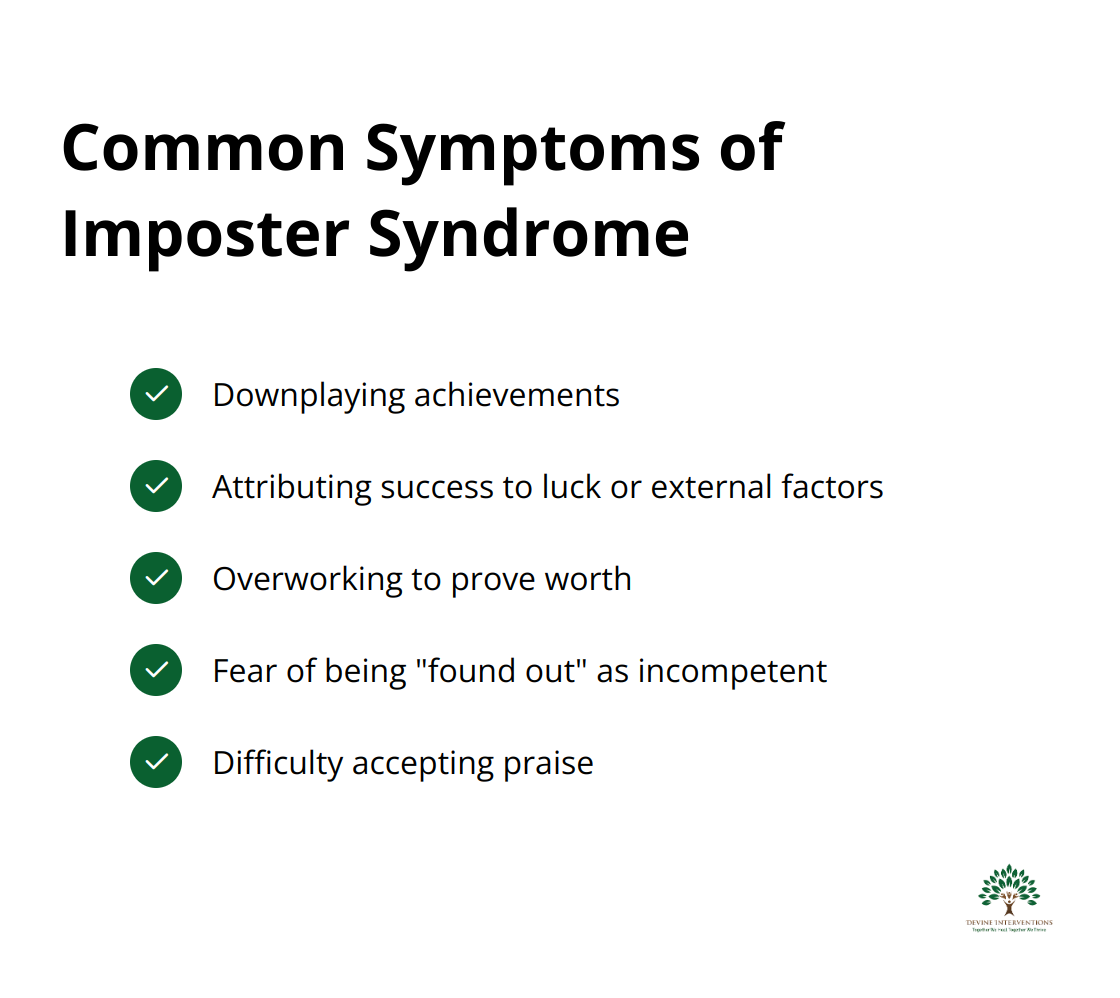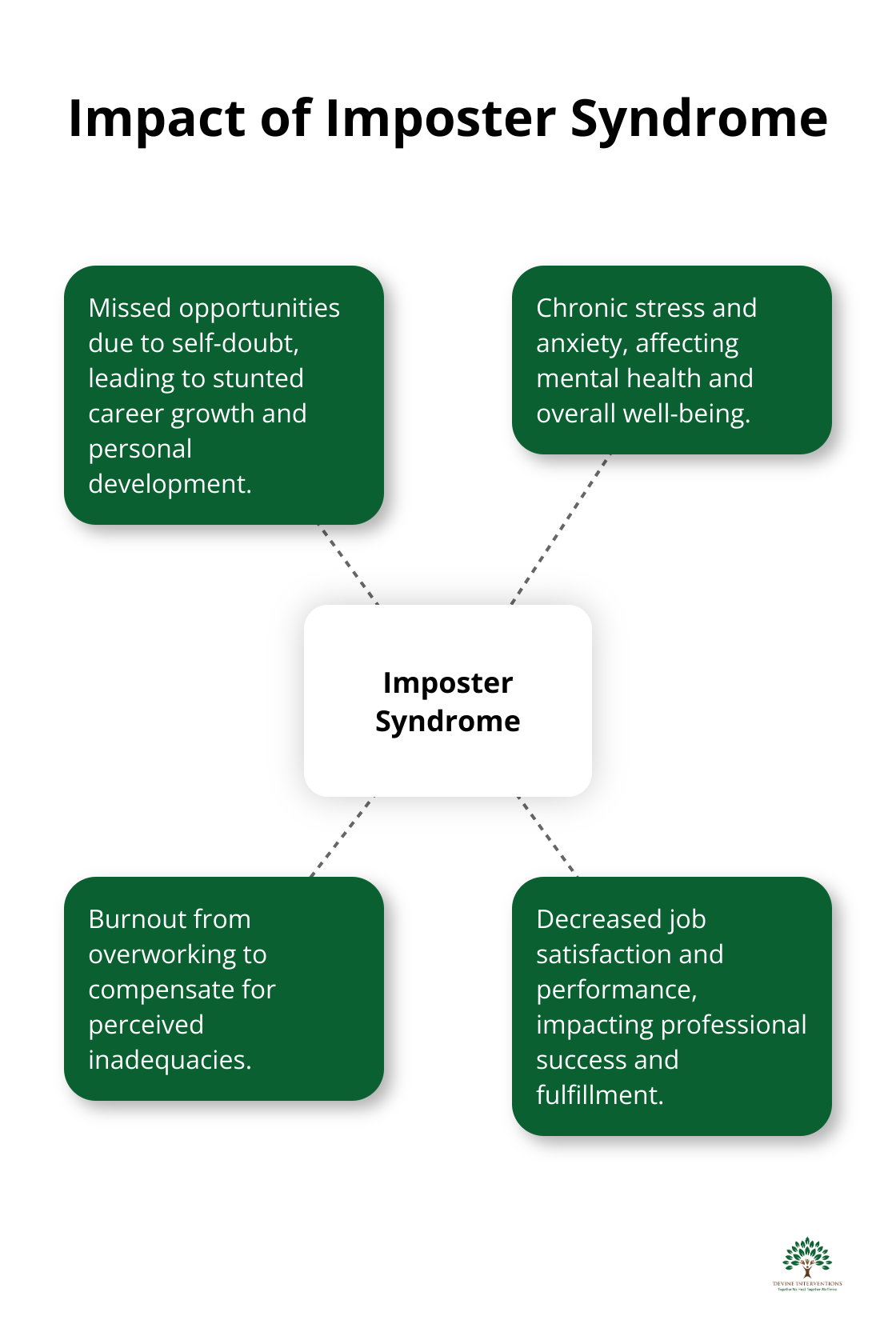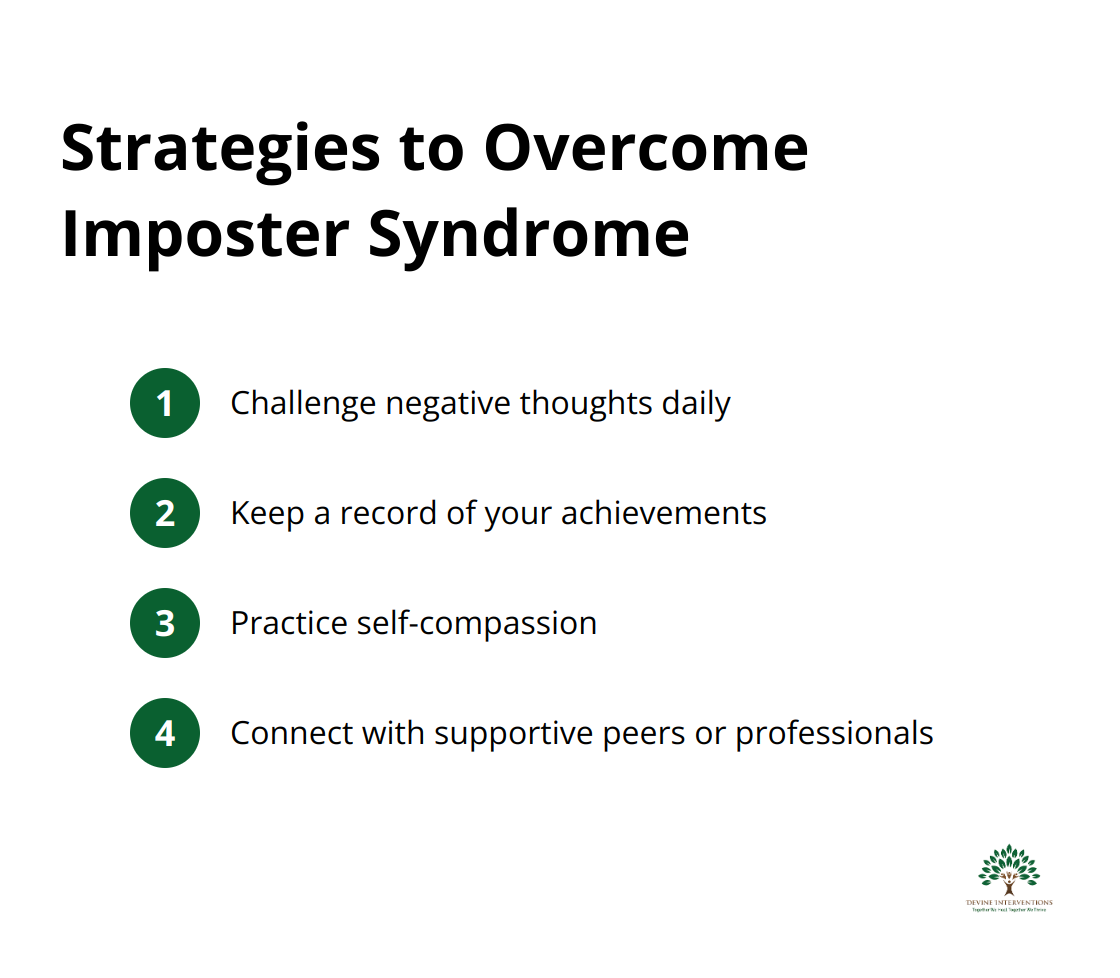At Devine Interventions, we understand the silent struggle of imposter syndrome. This pervasive feeling of self-doubt can affect anyone, regardless of their achievements or expertise.
In this post, we’ll explore how to recognize and overcome imposter syndrome, empowering you to embrace your true potential. Get ready to transform self-doubt into self-confidence with practical strategies and expert insights.
What Is Imposter Syndrome?
The Silent Struggle
Imposter syndrome is a psychological pattern where individuals doubt their abilities and feel like frauds despite evidence of their competence. This mindset can hold people back from reaching their full potential, affecting both personal and professional growth.
A Widespread Phenomenon
Imposter syndrome is more common than most people realize. It’s particularly prevalent in high-achieving individuals and those in competitive fields (such as tech, academia, and creative industries).
Recognizing the Signs
Spotting imposter syndrome is the first step to overcoming it. Common symptoms include:
- Downplaying achievements
- Attributing success to luck or external factors
- Overworking to prove worth
- Fear of being “found out” as incompetent
- Difficulty accepting praise
If you identify with these symptoms, you’re not alone. Many individuals struggle with these feelings, but recognition is the first step towards change.

The Root Causes
Imposter syndrome often stems from a mix of personal and societal factors. Perfectionism, family expectations, and societal pressures all play a role. For instance, first-generation professionals or those from underrepresented groups may feel additional pressure to prove themselves.
Childhood experiences, such as inconsistent praise or high expectations, can contribute to imposter feelings later in life. Understanding these root causes is essential for developing effective coping strategies.
The Impact on Your Life
Left unchecked, imposter syndrome can have serious consequences. It can lead to:
- Missed opportunities due to self-doubt
- Chronic stress and anxiety
- Burnout from overworking
- Decreased job satisfaction and performance
Addressing imposter syndrome can lead to significant improvements in both personal and professional life. It’s not just about feeling better – it’s about unlocking your true potential.
Now that we understand what imposter syndrome is and how it affects us, let’s explore how to recognize these feelings in yourself and take the first steps towards overcoming them.
Are You Experiencing Imposter Syndrome?
Recognizing the Signs
Imposter syndrome often hides in plain sight. You might constantly question your decisions or feel undeserving of your achievements. Perhaps you’ve passed up opportunities because you felt unqualified, despite possessing the necessary skills.
A powerful self-assessment technique involves keeping a thought journal. For a week, record moments when you feel inadequate or fraudulent. Analyze these entries for patterns. Do specific situations or people trigger these thoughts? This exercise will reveal the extent and triggers of your imposter feelings.
The Imposter Cycle
Imposter syndrome typically follows a predictable pattern. You set impossibly high standards, work excessively hard to meet them, and then attribute any success to luck or dismiss it as “not good enough.” This cycle reinforces feelings of fraudulence and perpetuates self-doubt.
To break this cycle, you must first recognize it. The next time you complete a project or receive praise, stop and reflect. Do you genuinely acknowledge your efforts, or do you discount your achievements?
The Hidden Costs
Imposter syndrome impacts far more than momentary self-doubt. It can significantly hinder personal and professional growth.
Professionally, it might cause you to avoid applying for promotions or speaking up in meetings. You might overwork to compensate for perceived inadequacies, leading to burnout. A recent study investigated the effect of external work predictors including performance pressure, specific business areas, and gender on imposter phenomenon.
Personally, these feelings can strain relationships and impact mental health. Constant self-doubt often leads to anxiety and depression. You might isolate yourself from friends and family, fearing they’ll “discover” your perceived incompetence.

Breaking Free from Imposter Syndrome
Recognizing these impacts marks the first step towards change. If you experience any of these effects, it’s time to take action. Professional support (like the services offered at Devine Interventions) can help you break free from the imposter syndrome cycle and reclaim your confidence.
Our personalized approach addresses the root causes of your feelings, empowering you to embrace your true capabilities. We use evidence-based techniques (such as Cognitive Behavioral Therapy) to help you reframe negative thoughts and build self-compassion.
Now that you can identify imposter syndrome in yourself, let’s explore effective strategies to overcome these feelings and boost your self-confidence.
How to Overcome Imposter Syndrome
Reframe Your Thoughts
Cognitive Behavioral Therapy (CBT) stands as a powerful tool against imposter syndrome. This technique helps you identify and challenge negative thought patterns. When you catch yourself thinking, “I don’t deserve this success,” try to reframe it to, “I worked hard for this achievement, and I earned it.”
A study in the Journal of Behavioral and Cognitive Therapy found that CBT techniques reduced imposter feelings in participants after just 10 weeks. This improvement shows the effectiveness of actively challenging negative thoughts.
Build Your Confidence Toolkit
Self-confidence isn’t innate; it’s a skill you can develop. Start a “wins” journal. Each day, write down three things you did well (no matter how small). This practice trains your brain to focus on your successes rather than perceived failures.
Visualization also proves effective. Spend five minutes each morning imagining yourself succeeding in your daily tasks. This mental rehearsal can boost your confidence and performance.
Celebrate Your Achievements
Many people with imposter syndrome struggle to acknowledge their accomplishments. Break this habit by creating a “brag file.” Add positive feedback or completed projects to your file whenever you receive them. Review this regularly, especially when you feel doubtful.
A University of California study found that individuals who regularly reflected on their achievements reported an increase in self-confidence over six months. This simple practice can significantly impact your self-perception.
Seek Support and Mentorship
You don’t have to face imposter syndrome alone. Reach out to mentors, peers, or professional support systems. Devine Interventions offers specialized programs designed to help individuals overcome imposter syndrome through group therapy and one-on-one counseling.
Sharing your feelings with others can validate your experiences. A survey found that up to 80% of people experience imposter syndrome at some point in their careers. Knowing you’re not alone can empower you to take the first step in overcoming these feelings.
Take Action Today
Overcoming imposter syndrome requires consistent effort and support. Try these strategies:
- Challenge negative thoughts daily
- Keep a record of your achievements
- Practice self-compassion
- Connect with supportive peers or professionals

Don’t let imposter syndrome hold you back any longer. Take the first step towards reclaiming your confidence today. Contact Devine Interventions to learn how our specialized programs can support your journey to overcome imposter syndrome and embrace your true potential.
Final Thoughts
Imposter syndrome can hold you back, but you have the power to overcome it. You can break free from self-doubt by challenging negative thoughts and celebrating your achievements. Self-compassion and visualization exercises will boost your confidence in real-life situations.
Support plays a vital role in addressing imposter syndrome. Connecting with mentors, peers, or professional counselors provides valuable perspective and encouragement. Overcoming these feelings leads to increased job satisfaction, improved performance, and better mental health.
We at Devine Interventions offer comprehensive support to help you conquer imposter syndrome. Our evidence-based practices and compassionate care empower you to build lasting confidence. Take the first step towards reclaiming your confidence today by visiting Devine Interventions to learn about our specialized programs.







